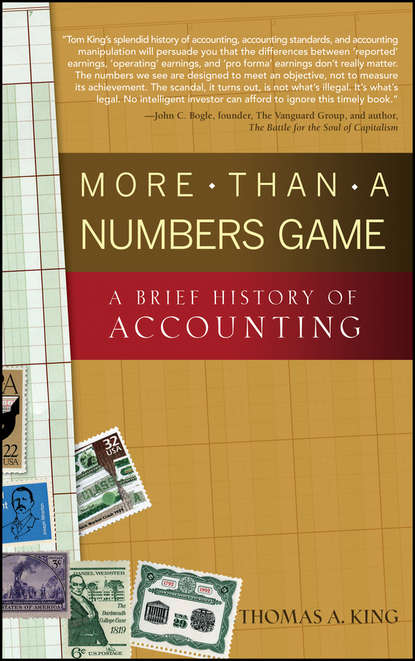Книга "More Than a Numbers Game. A Brief History of Accounting" - это история развития корпоративного бухгалтерского учета в США. Автор не описывает, как составлять и аудитировать финансовые отчеты, а скорее объясняет, почему в бухгалтерском учете возникают такие проблемы, как налоги, долги, опционы и волатильность доходности.
Автор книги, Элиас Р. Кинг, вдохновился выступлением председателя Комиссии по ценным бумагам и биржам Артура Левитта, в котором тот описал проблемы управления прибылями и предвосхитил кризис в корпоративном бухгалтерском учете в США. Книга представляет собой историю идей, описывая контроверзные вопросы, возникшие за последние сто лет, и объясняя, как экономика, финансы, право и деловые обычаи влияли на развитие бухгалтерского учета.
Книга не является описанием скандалов в бухгалтерском учете, а скорее рассказывает о том, как бухгалтерский учет стал инструментом корпоративного мошенничества. Каждая глава книги посвящена определенной проблеме, и автор обсуждает исторический контекст и рассказывает о людях, которые играли важную роль в ее развитии. Книга "More Than a Numbers Game" предлагает читателям интересный бизнес-рассказ о том, как бухгалтерский учет стал таким, каким мы его знаем сегодня.
The world suffers little shortage of books on accounting. They instruct us how to handle, validate, decipher and represent corporate financial facts — but there is no monograph offering context for vexed issues like taxation, cash, alternatives, and earn-according-to-circumstances risks. A synopsis of Thomas King's "More Than a Numbers Games: A Short History of Accountability" puts forward the basis of accounting as opposed to the methodology, providing professionals and students alike with a simple reading history of US corporate compliance strategy.
Электронная Книга «More Than a Numbers Game. A Brief History of Accounting» написана автором Thomas King A. в году.
Минимальный возраст читателя: 0
Язык: Английский
ISBN: 9780470041772
Описание книги от Thomas King A.
The world certainly suffers no shortage of accounting texts. The many out there help readers prepare, audit, interpret and explain corporate financial statements. What has been missing is a book offering context and discussion for divisive issues such as taxes, debt, options, and earnings volatility. King addresses the why of accounting instead of the how, providing practitioners and students with a highly readable history of U.S. corporate accounting. More Than a Numbers Game: A Brief History of Accounting was inspired by Arthur Levitt's landmark 1998 speech delivered at New York University. The Securities and Exchange Commission chairman described the too-little challenged custom of earnings management and presaged the breakdown in the US corporate accounting three years later. Somehow, over a one-hundred year period, accounting morphed from a tool used by American railroad managers to communicate with absent British investors into an enabler of corporate fraud. How this happened makes for a good business story. This book is not another description of accounting scandals. Instead it offers a history of ideas. Each chapter covers a controversial topic that emerged over the past century. Historical background and discussion of people involved give relevance to concepts discussed. The author shows how economics, finance, law and business customs contributed to accounting's development. Ideas presented come from a career spent working with accounting information.



















